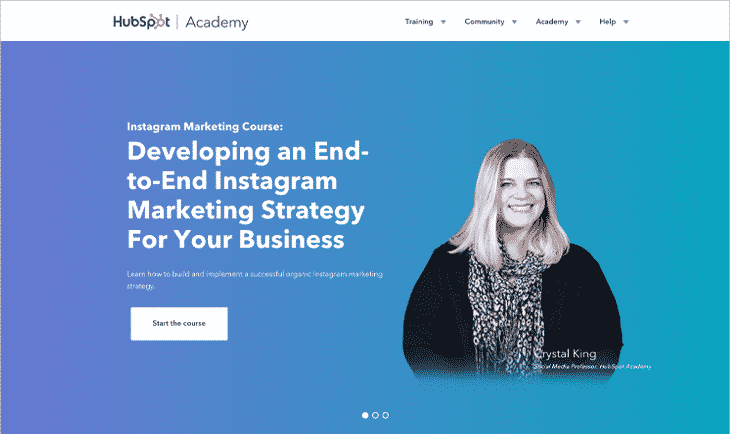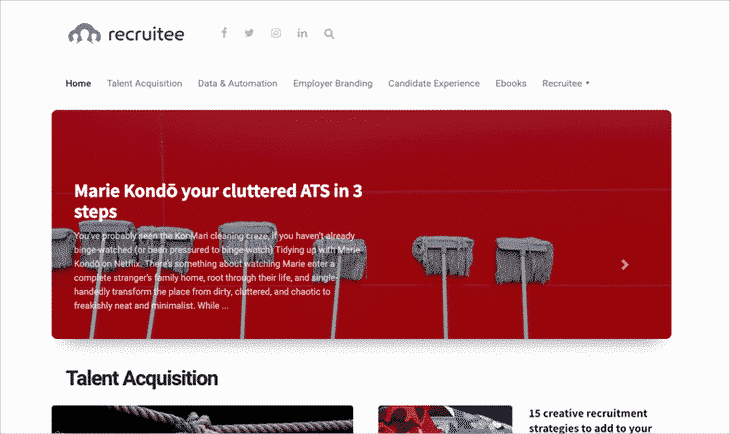The main difference when comparing inbound vs outbound recruiting is content sharing.
Inbound recruiting can be considered the marketing part of the recruitment process. You have probably heard that recruitment is becoming more and more like marketing. Well, in this case, that does ring true! The definition of inbound recruiting is a mashup of employer branding and content marketing strategies. It involves the creation of engaging content targeted toward potential, current, and future candidates. The ultimate goal is to increase employer brand recognition while providing useful and persuasive content to either: a) teach about the candidates’ field or b) reflect a positive perception of your company as an employer.
These goals go hand in hand. You want to create engaging content to keep up a stellar candidate experience. There are some major themes in inbound recruiting that you should be familiar with before diving in:
1. Content creation
The type of candidate-facing content you create can vary. Usually, you’ll want to create compelling media that tells the story of your brand. This can be through employer branding. Or you can create niche content to attract ready-to-learn talent in a certain field.
2. Lifecycle marketing
Nurturing potential and existing candidates is just as important (if not more so) as content creation. Talent may not apply the first time they see your content. Stay visible and relevant.
3. Multiple channels
One type of media will not cut it. How many of you only use one social media channel? What about only one website? Keep your content and branding consistent across channels for the best reach.
4. Integration of recruiting and overall brand
Recruitment analytics come into play here. If you’re putting in all this effort during inbound recruiting, you should be tracking your ROI. How does this help your company overall?
5. Culture-focused advantages
Inbound recruiting is about telling a story. Really dig deep into your company ecosystem. Translate that to your recruitment content marketing. Make talent want to apply (and stay!).
Creating content to keep your candidates (or potential talent) engaged is the first step. But how do you nurture the recruiter-candidate relationship? With the help of Debbie Sharvit, HR manager at Monday.com, and our #TAinnovators community, we have the perfect setup. Read on to learn how to get started with inbound recruiting – the right way.
Inbound recruiting 101: the best learning sources
The internet is a hub for knowledge. Inbound recruiting materials are common, but these are the most recommended by our community:
- Hubspot Academy, a haven for marketing info of all kinds;

- The Recruitee blog, our own culmination of knowledge and resources for inbound recruiting and beyond;

- Three Ears Media, experts with an online library on recruitment marketing with stories and statistics.

Long-term relationship management: the best tools
Here we are getting into the multi-channel approach mentioned above. What tools should you be using for long-term relationships with talent?
- Slack professional communities;
- Facebook community groups;
- Talent pools;
- All social channels (relevant to your brand);
- Project-sharing platforms, like The Practical Developer;
- Social work management tools, like Monday.com;
- Automated communication;
- Personalized communication;
- Honest communication.
Valuable content: the best practices
The best inbound recruiting tactics come in many forms, from using data to more qualitative metrics, such as personality type. Here is what we came up with, together:
- Empathy;
- Employee testimonials and personal stories;
- Various mediums, such as video from Skill Scout, email lists, and social pages/groups;
- Offer professional advancement and info;
- And, most importantly, engage consistently and often.
Niche content: the best resources
You aren’t just hiring for one type of employee. What should you do to target niche talent? Offering the best resources for their field shows that you know your stuff and are willing to help them get the most out of the new position. In this #TAinnovators chat, we talked about sales and customer success talent, specifically. Here are some ideas on what to share with them during inbound recruiting:
- Intercom blog;
- Hubspot’s sales resources;
- Stories from similar employees;
- Even providing a mentor from your company in the same department.
In essence, tailor your inbound recruiting to the open position and target talent! Don’t just push the same message about your company culture. It may be a solid message, but top talent will need more convincing. Show them that you care during inbound recruiting. As mentioned above, you should use personalized tactics and creative media! Use your imagination, and keep the employees (and future employees) in mind.
Here are some of the outstanding #TAinnovators contributors that helped make this inbound recruiting roundup possible:
Join us to share your input on Wednesdays at 11 a.m. ET by following #TAinnovators!
#TAinnovators is a live Twitter chat that delves into the talent acquisition world and encourages discussion of trending recruitment topics. Follow @Recruitee for updates.







